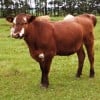The Vegan vs. Omnivore Debate Part 3
Of Media, PeTA/HSUS, and Consumers Alike
If the media gets so much a whiff of something bad that happened in the animal agricultural industry, like BSE (Mad Cow Disease), slaughter-house horrors, or inhumane treatment of animals, they're on it like a flock of vultures on a dying cow. They really put out their best efforts to horrify people, and they do a fine job of it too. It doesn't help when they start stereotyping all livestock farmers as uncaring, profit-driven individuals. The reality is that are a few folks out there who raise livestock and shouldn't, and it is these few individuals that help shine a bad light on the animal agricultural industry itself.
Animal activists love to show us how these animals that are raised for meat have feelings too. They express that animals are sentient, feeling beings that "share the same emotions that we do as humans." While this is does has some merit to it, what they don't realize is that animals are not humans, even though humans are animals, in our own way. Animals have their own way of expressing their own "feelings," if you will, and live in the now, never in the past or future like what us humans do. Yes, animals are indeed capable of feeling pain, discomfort and displeasure, but as I mentioned before, they do it in their own way, not in a way that we humans do and at our level. They also want people to "understand" that because they "are sentient, feeling beings," they should be treated like they way we treat other people. What gets me is that don't they realize that all herbivorous animals, including wildlife, are there because they are a part of what is called the food chain? The animals we raise to eat are a part of this network, no matter if they have feelings like we do or not.
But, that said, we do not have to treat animals like those that are money-producing machines, like many are in factory farms: caring for and treating livestock like nature would is more humane than shutting them up in cages or stalls for all of their lives. So animal activists do have a point, and I do agree with them that animals that are shut up in tiny cages with little room to move around, turn around, carry out its natural behaviors and communicate with other animals of its species is simply not humane and not right. But going to the extreme of destroying animals because "it's for their own good" isn't right either. Everything deserves a life, and it's better to give it as best a life as possible instead of destroying it.
Consumers are the worst part of this whole veganism thing. Many consumers today are many generations removed from their farming ancestors, and they do not really care much about what they eat unless it tastes good or looks good. This makes them much more easier targets for animal rights groups to "empty their wallets" in a manner of speaking. Propaganda and advertisements about animals being abused, neglected, whatever PeTA and HSUS have in their arsenal are highly useful for these groups to get these consumers on their side, and even convince them to change their eating habits "for the better of the animals," or "for the better of the environment." They are also unaware of where their food comes from; most of it's not what they think or where they think.
Much of our food found in the major grocery store is imported from other countries or other parts of the country, though we know very little of where it actually came from, how it was grown, and how it got here. Cities have grown because of the increase of the human population: and the livestock and food industry had to grow and expand to accommodate that growth and increase in many different tastes, cultures and ethnicities. Corn is in almost everything we eat, right down to the chemicals derived from the corn kernels that are put into packaged cookies, potato chips, wafer bars,Twinkies, and many other packaged foods. Almost all of the beef sold in major grocery stores are corn or grain-fed. Almost all milk from dairy cows comes from cows that are grain-fed. Even pork and chicken. Most of the fruit and vegetables sold at these major grocers are grown on a mass-produced scale over 3000 miles away. The "grain" we eat from bread is from GMO (genetically modified organism) cereal grains that have been selected to increase the amount of seeds on the wheat or rye plants, so crop farmers get more bushels per acre every year. Corn is far more GM (genetically modified) than other cereal crops. MIchael Pollan, author of The Omnivore's Dilemma, describes more how King Corn has taken over what and how we eat, and is a book that has a few more eye-opening details in it.
Because many consumers are blind to where their milk, beef, chicken and pork come from, they do not realize how these animals are farmed, and are shocked to realize that much of the meat they eat come from factory farmed animals, and not from those out on pasture or free-range. Some get so shocked that they decide to go vegan. Suddenly switching your diet to "save the animals" is a bit extreme. If you don't want to support factory farming but don't want to give up on your omnivorous diet, buy locally raised meats, meats that come from family farms, not "factory" farms. But there are many out there that do not have the time or the money to switch their diets, and instead prefer to get the meat that they can see through the cellophane, rather than the "stuff" wrapped in brown paper.
The Politics of it All
I find that in the States, the government is the worst culprit. The government (or at least, in part, the UN) seems to be encouraging intensive livestock production, and I don't mean the intensive livestock production in terms of grazing on pastures. No, they're encouraging the very thing that many vegans are rampaging about: Factory Farming. These corporate farms are getting more money for their mass producing farms, and major feedlots are getting more credits for what and how they feed livestock. Studies have shown time and time again that grain-feeding of cattle is the worst possible thing you could do to these animals, in terms of health, mobility, and environmental concerns. Health problems are remarkably obvious when looking at both the animals that are fed grain and the humans that eat the meat from those grain-fed animals. Environmental concerns from feedlots are even more stark, despite the FAO's ability to state that intensification of livestock is better for the environment. Scientists have found, in opposition to FAO's statements in Livestock's Long Shadow , that there is far more problems with soil erosion, soil pollution, water pollution, and air pollution than those small family farms which raise their livestock naturally, i.e. on grass.
Major meat packing companies which control what kind of beef they want to run through their slaughter plants are also funded by the federal government. Much of these meat packers, like the two giants in Canada (XL Foods and Cargil), OWN feedlots. And these feedlots are not like the privately owned smaller ones like those found up in the Athabasca-Westlock-Barrhead counties of Alberta. These feedlots are HUGE, buying and feeding hundreds of thousands of cattle, and then processing them in their own slaughter plants. With only two meat packing companies controlling the prices and the kind of cattle they like to see be run through their plants, it's no wonder that many family farms with cow-calf herds are going out of business. And here in Canada we don't have the worry about Agri-Food Canada getting suckered in to the bull that the UN FAO has published in their book like the USDA has. The USA has at least 5 times as many major meat packing companies as we do in Canada, and more trading partners than they can shake a stick at. They don't know how good they have it.
The BSE episode in 2003 hasn't helped matters here either. Since then we've had to deal with less income coming from exporting less beef to less trading partners (32 out of 100 are in trade with Canada), and as a result, beef prices have constantly decreased. With lower beef prices, more farms and ranches are pulling out. Even the big meat packers are seeing a decrease in profits (even though they are making far more than the average beef producer). I find it quite ironic that the United States state that they are "BSE free" when the cow that caused the whole BSE mess in 2003 came from the States, as did the subsequent other 10 or more cases that popped up in Canada. Why, if the USA has slammed down the suggestion to enforce more stringent testing of reportable diseases like BSE, as well as efforts to increase traceability in livestock, are they saying they are BSE free? Isn't that called lying? This "BSE-free" horse-crap that they tell everyone who will listen reminds me of the EPA's efforts to promote veganism and push the false statements that livestock in America are bigger greenhouse gas producers and the least healthiest food products to consume than any other. That, in itself, is also a lie. But hey, the general population seems to be stupid enough to buy into all this, which makes it easy to gain support from the urban-majority and all vegans and vegetarians that are around.
The funny thing is, is that we tend to find out the truth when it's too late, just like what happened with the Great Dust Bowl in the 1930s when vast areas of land were overgrazed and tilled for crops, as well as the Severe Winter of 1886-87 when thousands of cattle starved and froze to death because of overgrazing and lack of winter feed. Perhaps the same will come about if the US government get their way. But in all honesty, lets hope that does NOT happen.



